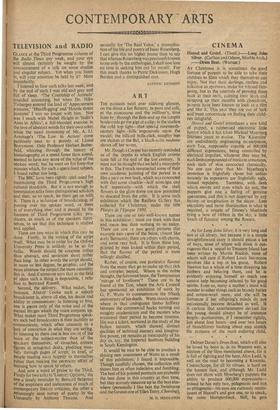CONTEMPORARY ARTS
TELEVISION and RADIO
GLANCE at the Third Programme column of the Radio Times any week, and your eye will almost certainly be caught by the announcement of a talk on some erudite and singular subject. Yet when you listen in, will your attention be held by it? Most improbably. I listened to four such talks last week, and by the end of each I was old and grey and full of sleep. The Courtship of Animals' sounded interesting, but when Dr. Niko Tinbergen entered the land of 'Appeasement postures," Headflagging' and Hostile threat postures' I was no longer with him. Nor was I much with Mabel Haight in 'India's Aims in Africa', a full-blooded exercise in the love of abstract words for their own sake; while the nasal monotony of Mr. A. LI. Armitage's 'The Law in Action' came perilously • near to a parody of Lionel Barrymore. Only Professor Herbert Butter- field, whizzing through the history of historiography at a speed faster than sound, seemed to have any sense of the value of the spoken word; but he went on for forty-five minutes which, for such a specialised subject, I found rather too long.
The BBC have been rightly applauded for maintaining the Third Programme's high cultural standards. But it is not enough to commission talks from distinguished scholars and then, so to speak, let than get on with it. There is a technique of broadcasting, of putting over the spoken word, as there is of everything else; and it should be the business of Third Programme talks pro- ducers, as much as of the speakers them- selves, to see that this technique is studied and applied. There are two ways in which this may be done. Firstly, in the writing of the script itself. What may be in order for the Oxford University Press is unlikely to be so for radio. Words should be concrete rather than abstract, and sentences short rather than long. In other words the script should, in more or less degree, be graphic; and the more abstruse the subject the more necessbry this is. And if someone says that in the field of ideas such a thing is impossible, I refer him to Bertrand Russell.
secondly for 'The Real Voice,' a dramatisa- tion of the life and poetry of Isaac Rosenberg. I can give this no higher praise than to say that whereas Rosenberg was previouslyknown to me only by the anthologies, I shall now lose no time in seeking him out for myself. For this much thanks to Patric Dickinson, Hugh Burden and a distinguished cast.
LUDOVIc KENNEDY
• ART


























 Previous page
Previous page